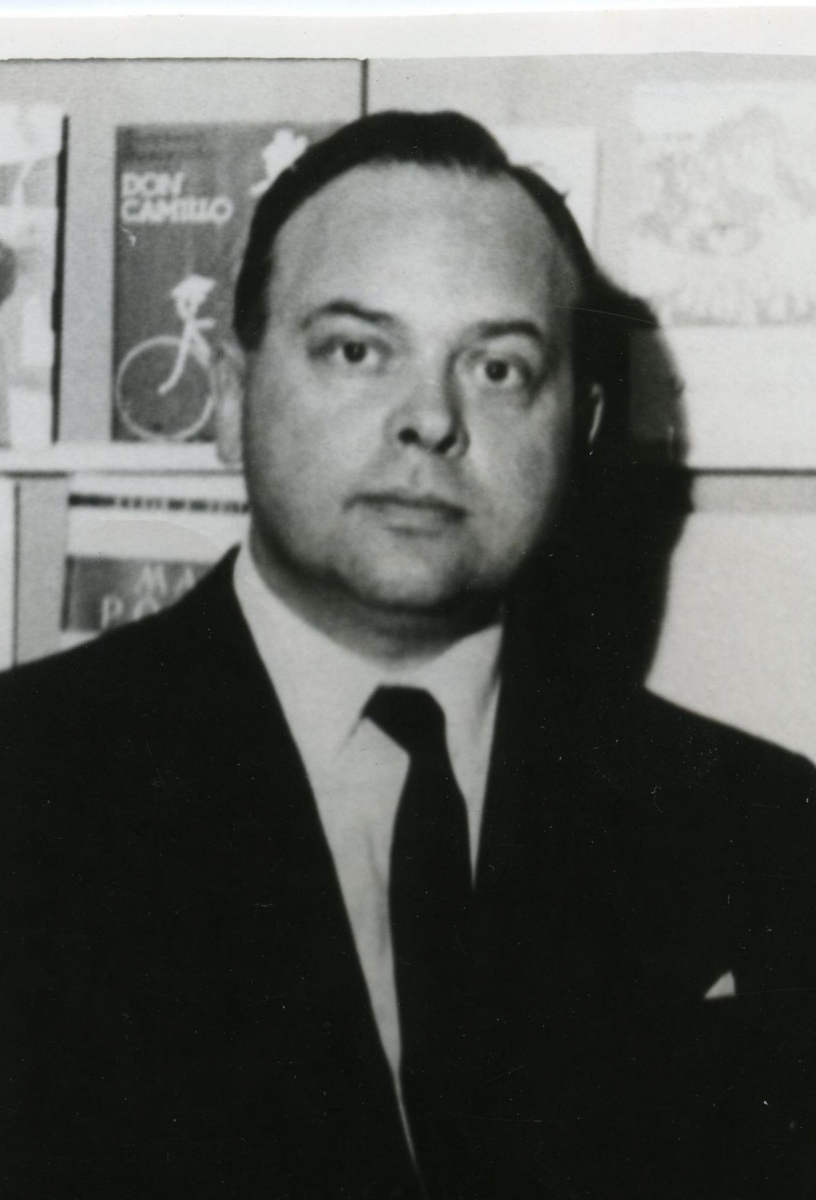
Ivar Grünthal
Ivar Grünthal (8. VI 1924 – 14. II 1996) was an Estonian refugee poet, critic, editor, and translator. He was the grandson of the statesman Jaan Poska and son of Tartu lawyers Vera Poska-Grünthal and Timotheus Grünthal. His childhood summers were spent in Muhumaa. He studied from 1932–41 at Hugo Treffner Gymnasium in Tartu, and in 1942 began studying medicine at the University of Tartu. In 1943, he transferred to the Faculty of Medicine at the University of Helsinki, and in 1944, he joined the Estonian volunteer infantry regiment No. 200 and partook in the Finnish Continuation War. In August 1944, he returned to Estonia but escaped in September to Sweden, staying in several refugee camps there. He then moved to Lund in 1945 and completed his medical degree at Lund University in 1951. Grünthal practiced medicine in Visby from 1952–1958 and from 1959 began providing health care to people without health insurance in Gothenburg. He was the founder and editor-in-chief (1957–1965) of Mana, a literary almanac for the younger generation of refugees. Mana also courageously addressed work published by Estonian authors still residing in Soviet Estonia. Grünthal was a member of the Estonian Writers’ Union Abroad, the Swedish Writers’ Union, the Estonian PEN Club, and the Swedish PEN Club. In 1959, he was awarded the Henrik Visnapuu Literature Prize. He belonged to the Swedish Social Democratic Workers’ Party and was a minister without portfolio as well as acting minister of social affairs of the Estonian government-in-exile.
Ivar Grünthal debuted with verses published in 1939 in his school’s newspaper, Miilang. He won an essay competition held among schools in Tartu. In Sweden, he started to publish poetry in the almanac Eesti Looming. He has published six poetry collections: Uni lahtiste silmadega (‘A Dream with Open Eyes’, 1951), Müüdid mülka põhja kadund maast (‘Myths about the Land Sunken into the the Bottom of the Guagmire’, 1953), Must pühapäev (‘Black Sunday’, 1954), Meri (‘The Sea’, 1958), Lumi ja lubi (‘Snow and Lime’, 1960) and Mõõt on täis (‘Reached the Limit’, 1964). He was one of the few capable of writing epic verse novels: Peetri kiriku kellad (‘The Bells of St. Peter’s Church’, 1962) and Laulu võim (‘The Power of Song’, 1966–86). Grünthal translated Estonian poetry to Swedish. The sampler Poèmes–Gedichte–Dikter (1964, foreword by Ivar Ivask) contains translations of poems by Grünthal and the surrealist Ilmar Laaban into French, German, and Swedish. At home in Estonia, Grünthal’s work was introduced in the bulky volume of collected poetry Neitsirike (‘Virgin Error’, 1995), the collection Öine piilkond (‘Nocturnal Scout Regiment’, 2002), and the verse novel Laulu võim (‘The Power of Song’, 2008). The best of his literary criticism was compiled into the essay collection Müütide maagia (‘The Magic of Myths’, 2001).
Grünthal’s poetry is analytical and masculine: offensive, political, erotic, with strong principles of contrast. He is simultaneously vulgar yet virtuous, sublime yet shallow, spiritual yet physiological, expressionistic yet sentimental. A sensitive bipolar interconnection of euphoria and skepticism, aggression and depression that characterizes refugee poetry is particularly acute in Grünthal. He has a seamless and cultured verse technique and is fluent in rhyming. Strong is a descriptive and narrative slant, a lyrical approach to prose. The themes of his early collections are war and love, the pain of a lost generation and a lost homeland; existential doubts and contradictions in the refugee community appear later. The earlier poetic persuasiveness eventually becomes a critical tour de force. The first part of his verse novel dilogy depicts the spiritual and sexual maturation of a musically-gifted adolescent in a pre-war Tartu, thus being a Bildungsroman; the second part reflects hectically upon the spiritual confusion and post-traumatic stress caused by a Stalinist occupation. Grünthal felt that art could help alleviate this national catastrophe.
A. M. (Translated by M. M.)
Books in Estonian
Poems
Uni lahtiste silmadega: luuleproosat. Göteborg, Toronto: Orto, 1951, 87 lk.
Müüdid mülka põhja kadund maast: teine kogu luuletusi. Stockholm: Vaba Eesti, 1953, 63 lk. [2. trükk: 1960.]
Must pühapäev: kolmas kogu luuletusi. Stockholm: Vaba Eesti, 1954, 64 lk.
Meri: neljas kogu luuletusi. Stockholm: Vaba Eesti, 1958, 76 lk.
Lumi ja lubi: V kogu luulet. Stockholm: Vaba Eesti, 1960, 131 lk.
Mõõt on täis: VI kogu luuletusi. Stockholm: Vaba Eesti, 1964, 207 lk.
Neitsirike. Koostanud ja eessõna: Hando Runnel. Tartu: Ilmamaa, 1995, 350 lk.
Öine piilkond. Parimat Ivar Grünthalilt. Tallinn: Eesti Luuleliit, 2002, 43 lk. [Sari ‘Luuleliidu luulevihik’.]
Verse novels
Peetri kiriku kellad. Göteborg: Mana, 1962, 162 lk.
Laulu võim. Mana, 1966–1986. [2. trükk: Tartu: Ilmamaa, 2008, 349 lk.]
Non-fiction
Müütide maagia. Koostanud ja järelsõna: Mall Jõgi. Tartu: Ilmamaa, 2001, 526 lk. [Eesti mõttelugu, 40.]



